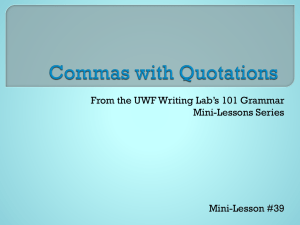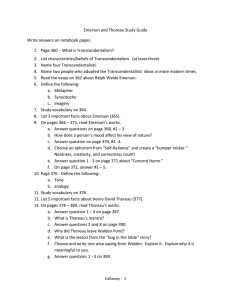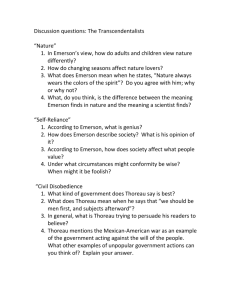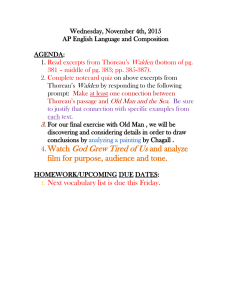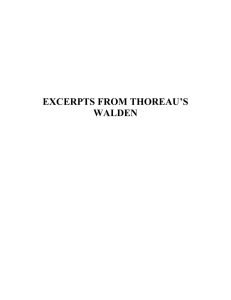Emerson and Thoreau
advertisement
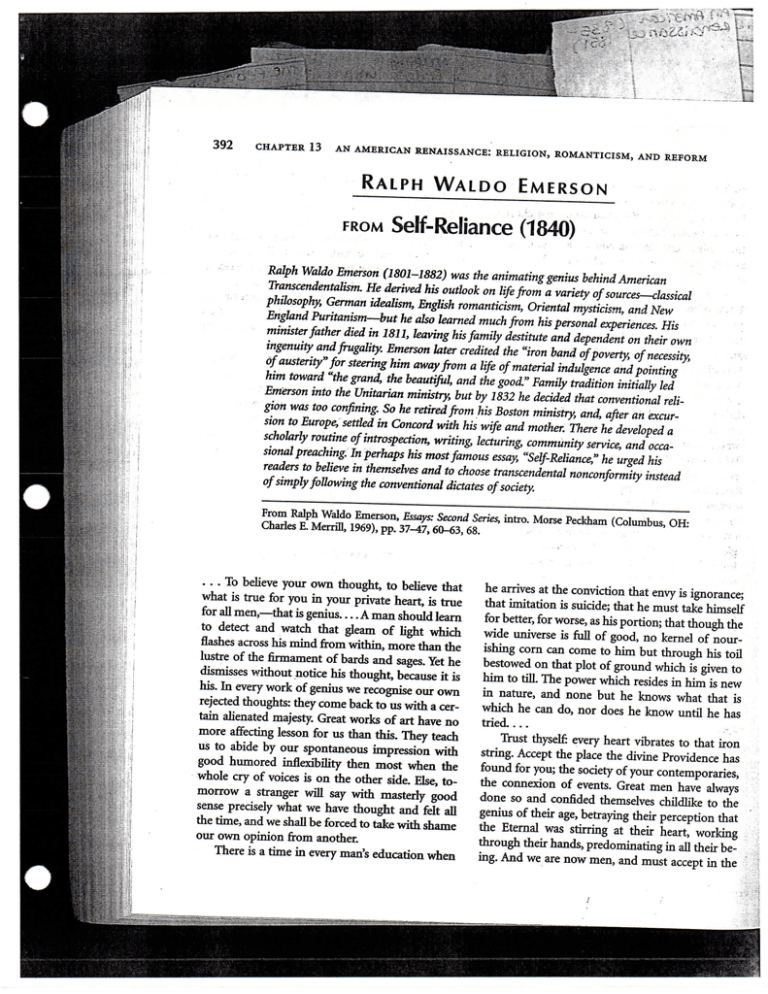
392 CHAPTER 13 AN AMERICAN RENAISSANCE: RELIGION, ROMANTICISM, AND REFORM RALPH WALDO EMERSON FROM Self-Reliance (1840) Ralph Waldo Emerson (1801—1882) was the animating genius behind American Transcendentalism. He derived his outlook on life from a variety of sources—classical philosophy, German idealism, English romanticism, Oriental mysticism, and New England Puritanism—but he also learned much from his personal experiences. His minister father died in 1811, leaving his family destitute and dependent on their own ingenuity and frugality. Emerson later credited the "iron band of poverty, of necessity, of austerity" for steering him away from a life of material indulgence and pointing him toward "the grand, the beautiful, and the good," Family tradition initially led Emerson into the Unitarian ministry, but by 1832 he decided that conventional religion was too confining. So he retired from his Boston ministry, and, after an excursion to Europe, settled in Concord with his wife and mother. There he developed a scholarly routine of introspection, writing, lecturing, community service, and occasional preaching. In perhaps his most famous essay, "Self-Reliance," he urged his readers to believe in themselves and to choose transcendental nonconformity instead of simply following the conventional dictates of society. From Ralph Waldo Emerson, Essays: Second Series, intro. Morse Peckham (Columbus, OH: Charles E. Merrill, 1969), pp. 37-47, 60-^3, 68. . . . To believe your own thought, to believe that what is true for you in your private heart, is true for all men,—that is genius A man should learn to detect and watch that gleam of light which flashes across his mind from within, more than the lustre of the firmament of bards and sages. Yet he dismisses without notice his thought, because it is his. In every work of genius we recognise our own rejected thoughts: they come back to us with a certain alienated majesty. Great works of art have no more affecting lesson for us than this. They teach us to abide by our spontaneous impression with good humored inflexibility then most when the whole cry of voices is on the other side. Else, tomorrow a stranger will say with masterly good sense precisely what we have thought and felt all the time, and we shall be forced to take with shame our own opinion from another. There is a time in every man's education when he arrives at the conviction that envy is ignorance; that imitation is suicide; that he must take himself for better, for worse, as his portion; that though the wide universe is full of good, no kernel of nourishing corn can come to him but through his toil bestowed on that plot of ground which is given to him to till. The power which resides in him is new in nature, and none but he knows what that is which he can do, nor does he know until he has tried.... Trust thyself: every heart vibrates to that iron string. Accept the place the divine Providence has found for you; the society of your contemporaries, the connexion of events. Great men have always done so and confided themselves childlike to the genius of their age, betraying their perception that the Eternal was stirring at their heart, working through their hands, predominating in all their being. And we are now men, and must accept in the RALPH WALDO EMERSON: FROM Sclf-Reliance (1840) highest mind the same transcendent destiny; and • not pinched in a corner, not cowards fleeing before a revolution, but redeemers and benefactors, pious . aspirants to be noble clay plastic under the • Almighty effort, let us advance and advance on Chaos and the Dark. r''%:', Society everywhere is in conspiracy against the - manhood of every one of its members. Society is a joint-stock company in which the members agree . for the better securing of his bread to each shareholder, to surrender the liberty and culture of the eater. The virtue in most request is conformity. Self-reliance is its aversion. It loves not realities and creators, but names and customs. Whoso would be a man must be a nonconformist. He who would gather immortal palms must not be hindered by the name of goodness, but must explore if it be goodness. Nothing is at last sacred but the integrity of our own mind.... I am ashamed to think how easily we capitulate to badges and names, to large societies and dead institutions. Every decent and well-spoken individual affects and sways me more than is right. I ought to go upright and vital, and speak the rude truth in all ways. If malice and vanity wear the coat of philanthropy, shall that pass? If an angry bigot assumes this bountiful cause of Abolition, and comes to me with his last news from Barbadoes, why should I not say to him, 'Go love thy infant; love thy wood-chopper: be good-natured and modest: have that grace; and never varnish your hard, uncharitable ambition with this incredible tenderness for black folk a thousand miles off. Thy love afar is spite at home.5 Rough and graceless would be such greeting, but truth is handsomer than the affectation of love. Your goodness must have some edge to it—else it is none.... Virtues are in the popular estimate rather the exception than the rule. There is the man and his virtues. Men do what is called a good action, as some piece of courage or charity, much as they would pay a fine in expiation of daily nonappearance on parade. Their works are done as an apology or extenuation of their living in the 393 world,—as invalids and the insane pay a high board. Their virtues are penances. I do not wish to expiate, but to live. My life is not an apology, but a life. It is for itself and not for a spectacle. I much prefer that it should be of a lower strain, so it be genuine and equal, than that it should be glittering and unsteady. . . . My life should be unique; it should be an alms, a battle, a conquest, a medicine. ... I know that for myself it makes no difference whether I do or forbear those actions which are reckoned excellent. I cannot consent to pay for a privilege where I have intrinsic right Few and mean as my gifts may be, I actually am, and do not need for my own assurance or the assurance of my fellows any secondary testimony. What I must do, is all that concerns me, not what the people think. This rule, equally arduous in actual and in intellectual life, may serve for the whole distinction between greatness and meanness. It is the harder, because you will always find those who think they know what is your duty better than you know it It is easy in the world to live after the world's opinion; it is easy in solitude to live after our own; but the great man is he who in the midst of the crowd keeps with perfect sweetness the independence of solitude. For non-conformity the world whips you with its displeasure. And therefore a man must know how to estimate a sour face. The bystanders look askance on him in the public street or in the friend's parlor. If this aversation had its origin in contempt and resistance like his own, he might well go home with a sad countenance; but the sour faces of the multitude, like their sweet faces, have no deep cause,— disguise no god, but are put on and off as the wind blows, and a newspaper directs. Yet is the discontent of the multitude more formidable than that of the senate and the college. It is easy enough for a firm man who knows the world to brook the rage of the cultivated classes. Their rage is decorous and prudent, for they are timid as being very vulnerable themselves. But when to their feminine rage the indignation of the people is added, when the ignorant and the poor are aroused, when the unintelligent 1 394 CHAPTER 13 AN AMERICAN RENAISSANCE: RELIGION, ROMANTICISM, AND REFORM brute force that lies at the bottom of society is made to growl and mow, it needs the habit of magnanimity and religion to treat it godlike as a trifle of no concernment. The other terror that scares us from self-trust is our consistency; a reverence for our past act or word, because the eyes of others have no other data for computing our orbit than our past acts, and we are loath to disappoint them. A foolish consistency is the hobgoblin of little minds, adored by little statesmen and philosophers and divines. With consistency a great soul has simply nothing to do. He may as well concern himself with his shadow on the wall Out upon your guarded lips! Sew them up with packthread, do. Else, if you would be a man, speak what you think to-day in words as hard as cannon balls, and to-morrow speak what tomorrow thinks in hard words again, though it contradict every thing you said to-day. Ah, then, exclaim the aged ladies, you shall be sure to be misunderstood. Misunderstood! It is a right fool's word. Is it so bad then to be misunderstood? Pythagoras was misunderstood, and Socrates, and Jesus, and Luther, and Copernicus, and Galileo, and Newton, and every pure and wise spirit that ever took flesh. To be great is to be misunderstood. The populace think that your rejection of popular standards is a rejection of all standard, and mere antinomianism; and the bold sensualist will use the name of philosophy to gild his crimes. But the law of consciousness abides. There are two confessionals, in one or the other of which we must be shriven. You may fulfil your round of duties by clearing yourself in the direct, or, in the reflex way. Consider whether you have satisfied your relations to father, mother, cousin, neighbor, town, cat, and dog; whether any of these can upbraid you. But I may also neglect this reflex standard, and absolve me to myself. I have my own stern claims and perfect circle. It denies the name of duty to many offices that are called duties. But if I can discharge its debts, it enables me to dispense with the popular code. If any one imagines that this law is lax, let him keep its commandment one day. And truly it demands something godlike in him who has cast off the common motives of humanity, and has ventured to trust himself for a task-master. High be his heart, faithful his will, clear his sight, that he may in good earnest be doctrine, society, law to himself, that a simple purpose may be to him as strong as iron necessity is to others. If any man consider the present aspects of what is called by distinction society, he will see the need of these ethics. The sinew and heart of man seem to be drawn out, and we are become timorous desponding whimperers. We are afraid of truth, afraid of fortune, afraid of death, and afraid of each other. Our age yields no great and perfect persons. We want men and women who shall renovate life and our social state, but we see that most natures are insolvent; cannot satisfy their own wants, have an ambition out of all proportion to their practical force, and so do lean and beg day and night continually. Our housekeeping is mendicant, our arts, our occupations, our marriages, our religion we have not chosen, but society has chosen for us. We are parlor soldiers. The rugged battle of fate, where strength is born, we shun. It is easy to see that a greater self-reliance,—a new respect for the divinity in man,—must work a revolution in all the offices and relations of men; in their religion; in their education; in their pursuits; their modes of living; then- association; in their property; in their speculative views. Insist on yourself; never imitate. Your own gift you can present every moment with the cumulative force of a whole life's cultivation; but of the adopted talent of another, you have only an extemporaneous, half possession. That which each can do best, none but his Maker can teach him. No man yet knows what it is, nor can, till that HENRY DAVID THOREAU: FROM Walden (1854) person has exhibited it Where is the master who could have taught Shakspeare? Where is the master who could have instructed Franklin, or Washington, or Bacon, or Newton. Every great man is an unique.... , REVIEW QUESTIONS 1. How did Emerson define genius? 2. How was Emerson's promotion of nonconfor- 395 mity a refutation of the Enlightenment philosophy that was a foundation of the Republic (e.g., Locke's idea of social contract)? 3. Do you see any potential problems with Emerson's emphasis on absolute nonconformity to the ways of the world? Did he anticipate any such problems? 4. Why did Emerson consider consistency to be a vice rather than a virtue? 5. What does a comparison of Emerson's and Finney's works (and their followers) reveal about society in antebellum America? HENRY DAVID THOREAU FROM WaJden (1854) "I like people who can do things? Emerson said, and Henry David Thoreau (1817— 1862) could do many things well, including carpentry, masonry, painting, surveying, sailing, and gardening. After graduating from Harvard and teaching school for several years, Thoreau decided to focus his energies on his true passions—nature study and poetry. The rebellious son of a pencil-maker father and abolitionist mother, Thoreau exuded a spirit of uncompromising integrity, manly vigor, self-reliant simplicity, and tart individuality. The short and sinewy Thoreau joyfully mastered the woodland arts. He loved to muck about in swamps and fields, communing with mud turtles and loons as well as his inner self. On 4 July 1845, Thoreau moved into a small cabin he had built on land owned by Emerson bordering Walden Pond, about two miles from Concord. Armed with jackknife, spyglass, diary, and pencil he found the woods and fields alive with fascinating sights, spiritual meaning, and elemental truths. During his twenty-six months at Walden Pond, Thoreau learned to simplify his material wants so as to "entertain the true problems of life." In Walden he offered readers a richly textured journal of his thoughts and activities while engaged in plain living and high thinking at Walden Pond. Although he returned to live in his family's household in 1847, Thoreau's heart remained in the woods. From Henry David Thoreau, The Writings of Henry David Thoreau, vol. 2 (Boston: Houghton Mifflin, 1906), pp. 8-10,100-103,108-109, 355-356. 396 CHAPTER 13 AN AMERICAN RENAISSANCE: RELIGION, ROMANTICISM, AND REFORM The mass of men lead lives of quiet desperation. What is called resignation is confirmed desperation. From the desperate city you go into the desperate country, and have to console yourself with the bravery of minks and muskrats. A stereotyped but unconscious despair is concealed even under what are called the games and amusements of mankind. There is no play in them, for this comes after work. But it is a characteristic of wisdom not to do desperate things. When we consider what, to use the words of the catechism, is the chief end of man, and what are the true necessaries and means of life, it appears as if men had deliberately chosen the common mode of living because they preferred it to any other. Yet they honestly think there is no choice left. But alert and healthy natures remember that the sun rose clear. It is never too late to give up our prejudices. No way of thinking or doing, however ancient, can be trusted without proof. What everybody echoes or in silence passes by as true to-day may turn out to be falsehood tomorrow, mere smoke of opinion, which some had trusted for a cloud that would sprinkle fertilizing rain on their fields. What old people say you cannot do, you try and find that you can. Old deeds for old people, and new deeds for new.... I have lived some thirty years on this planet, and I have yet to hear the first syllable of valuable or even earnest advice from my seniors. They have told me nothing, and probably cannot tell me anything to the purpose. Here is life, an experiment to a great extent untried by me; but it does not avail me that they have tried it. If I have any experience which I think valuable, I am sure to reflect that this my Mentors said nothing about. I went to the woods because I wished to live deliberately, to front only the essential facts of life, and see if I could not learn what it had to teach, and not, when I came to die, discover that I had not lived. I did not wish to live what was not life, living is so dear; nor did I wish to practise resignation, unless it was quite necessary. I wanted to live deep and suck out all the marrow of life, to live so sturdily and Spartan-like as to put to rout all that was not life, to cut a broad swath and shave close, to drive life into a corner, and reduce it to its lowest terms, and, if it proved to be mean, why then to get the whole and genuine meanness of it, and publish its meanness to the world; or if it were sublime, to know it by experience, and be able to give a true account of it in my next excursion. For most men, it appears to me, are in a strange uncertainty about it, whether it is of the devil or of God, and have somewhat hastily concluded that it is the chief end of man here to "glorify God and enjoy him forever." Still we live meanly, like ants; though the fable tells us that we were long ago changed into men; . . . Our life is frittered away by detail. An honest man has hardly need to count more than his ten fingers, or in extreme cases he may add his ten toes, and lump the rest. Simplicity, simplicity, simplicity! I say, let your affairs be as two or three, and not a hundred or a thousand; instead of a million count half a dozen, and keep your accounts on your thumb-nail. In the midst of this chopping sea of civilized life, such are the clouds and storms and quicksands and thousand-and-one items to be allowed for, that a man has to live, if he would not founder and go to the bottom and not make his port at all, by dead reckoning, and he must be a great calculator indeed who succeeds. Simplify, simplify. Instead of three meals a day, if it be necessary eat but one; instead of a hundred dishes, five; and reduce other things in proportion The nation itself, with all its so-called internal improvements, which, by the way are all external and superficial, is just such an unwieldy and overgrown establishment, cluttered with furniture and tripped up by its own traps, ruined by luxury and heedless expense, by want of calculation and a worthy aim, as the million households in the land; and the only cure for it, as for them, is in a rigid economy, a stern and more than Spartan simplicity of life and elevation of purpose. It lives too fast. Men think that it is essential that the Nation have commerce, and export ice, and talk through a telegraph, and ride thirty miles an hour, without a doubt, whether HENRY DAVID THOREAU: FROM Walden (1854) rfiey do or not; but whether we should live like baboons or like men, is a little uncertain. If we do not get out sleepers, and forge rails, and devote days and nights to the work, but go to tinkering upon our lives to improve them, who will build railroads? And if railroads are not built, how shall we get to heaven in season? But if we stay at home and mind our business, who will want railroads? We do not ride on the railroad; it rides upon us. Did you ever think what those sleepers are that underlie the railroad? Each one is a man, an Irishman, or a Yankee man. The rails are laid on them, and they are covered with sand, and the cars run smoothly over them. They are sound sleepers, I assure you. And every few years a new lot is laid down and run over; so that, if some have the pleasure of riding on a rail, others have the misfortune to be ridden upon.... Why should we live with such hurry and waste of life? We are determined to be starved before we are hungry. Men say that a stitch in time saves nine, and so they take a thousand stitches to-day to save nine to-morrow.... Let us spend one day as deliberately as Nature, and not be thrown off the track by every nutshell and mosquito's wing that falls on the rails. Let us rise early and fast, or break fast, gently and without perturbation; let company come and let company go, let the bells ring and the children cry,—determined to make a day of it. Why should we knock under and go with the stream? Let us not be upset and overwhelmed in that terrible rapid and whirlpool called a dinner, situated in the meridian shallows. Weather this danger and you are safe, for the rest of the way is down hill. With unrelaxed nerves, with morning vigor, sail by it, looking another way, tied to the mast like Ulysses. If the engine whistles, let it whistle till it is hoarse for its pains. If the bell rings, why should we run? We will consider what kind of music they are like. Let us settle ourselves, and work and wedge our feet downward through the mud and slush of opinion, and prejudice, and tradition, and delusion, and appearance, that alluvion which covers the globe, 397 through Paris and London, through New York and Boston and Concord, through Church and State, through poetry and philosophy and religion, till we come to a hard bottom and rocks in place, which we can call reality,... Be it life or death, we crave only reality. If we are really dying, let us hear the rattle in our throats and feel cold in the extremities; if we are alive, let us go about our business. I left the woods for as good a reason as I went there. Perhaps it seemed to me that I had several more lives to live, and could not spare any more time for that one. It is remarkable how easily and insensibly we fall into a particular route, and make a beaten track for ourselves. I had not lived there a week before my feet wore a path from my door to the pond-side; and though it is five or six years since I trod it, it is still quite distinct. It is true, I fear that others may have fallen into it, and so helped to keep it open. The surface of the earth is soft and impressible by the feet of men; and so with the paths which the mind travels. How worn and dusty, then, must be the highways of the world, how deep the ruts of tradition and conformity! ... I learned this, at least, by my experiment; that if one advances confidently in the direction of his dreams, and endeavors to live the life which he has imagined, he will meet with a success unexpected in common hours. He will put some things behind, will pass an invisible boundary; new, universal, and more liberal laws will begin to establish themselves around and within him; or the old laws be expanded, and interpreted hi his favor in a more liberal sense, and he will live with the license of a higher order of beings. In proportion as he simplifies his life, the laws of the universe will appear less complex, and solitude will not be solitude, nor poverty poverty, nor weakness weakness. If you have built castles in the air, your work need not be lost; that is where they should be. Now put the foundations under them. Eyewitness to America • and Mrs. Stratton was greatly astonished to find her son heralded in my fytuseum bills as GENERAL TOM THUMB, a dwarf of eleven years of age, just arrived from England! This announcement contained two deceptions. I shall not attempt to justify them, but may be allowed to plead the circumstances in extenuation. The boy was undoubtedly a dwarf, and I had the most reliable eviI November 1 842 dence that he had grown little, if any, since he was six months old; but had Bridgeport* Connecticut I announced him as only five years of age, it would have been impossible to excite the interest or awaken the curiosity of the public. The thing I aimed at was, to assure them that he was really a dwarf—and in this, at E -AS TAYLOR B A R N U M least, they were not deceived. It was of no consequence, in reality, where he was born or where he e's a sucker bom every minute" came from, and if the announcement that he was a foreigner answered throughout his life. No lie my purpose, the people had only themselves to blame if they did not : He turned sideshow performers get their money's worth when they visited the exhibition. I had ob[liefaked oddities such as the Fiji served . . . the American fancy for European exotics; and if the decepthalfof amonkey to the tail of a tion . . . has done anything toward checking our disgraceful preference jono'ui elephant Jumbo. He built a \ City. Barnum remained for foreigners, I may readily be pardoned for the offense I here acknowlr time.As many as twenty miledge. [THUMB .:'•- - ' "'"Si wfjiaphy-—a best-seller, of [ in Bridgeport; and by my He was the smallest child I ihvo feet in height, and it-eyed little fellow, with gr, and as symmetrical as '.some coaxing he was the was the son of SheriHes S. Stratton. After fined to secure his serwrf of that age might 11 dwarf? Some license I<his advantage I really 1 experiment, and I Collars per week— f and mother, being December 8, 1842, "What hath God wrought!" THE FIRST TELEGRAPH MESSAGE March 4, 1843, and May 24, 1844 Washington, D.C., and Baltimore, Maryland S A M U E L F. B. M O R S E amuel Finley Breese Morse was better known as a painter when he began working on the telegraph in 1832, collaborating with other inventors to improve on existing ideas. He built a working model, devised his famous code, and solved the problem of long-distance transmission by creating a relay device. But because the invention was not wholly original, he had to spend years defending his patent claim, which the Supreme Courtjinally upheld in 1854. S I had spent at Washington two entire sessions of Congress, one in l8 37~'3 8 > the other in i842-'43, in the endeavor so far to interest the • Eyewitness to America Government in the novel Telegraph as to furnish me with the means to construct a line of sufficient length to test its practicability and utility. The last days of the last session of that Congress were about to close. A bill appropriating thirty thousand dollars for my purpose had passed the House, and was before the Senate for concurrence, waiting its turn on the calendar. On the last day of the session (3d of March, 1843) I had spent the whole day and part of the evening in the Senate-chamber anxiously •watching the progress of the passing of the various bills, of which there were, in the morning of that day, over one hundred and forty to be acted upon, before the one in which I was interested would be reached; and a resolution had a few days before been passed, to proceed with the bills on the calendar in their regular order, forbidding any bill to be taken up out of its regular place. As evening approached there seemed to be but little chance that the Telegraph Bill would be reached before the adjournment, and consequently I had the prospect of the delay of another year, with the loss of time, and all my means already expended. In my anxiety, I consulted with two of my senatorial friends—Senator Huntington, of Connecticut, and Senator Wright, of New York—asking their opinion of the probability of reaching the bill before the close of the session. Their answers were discouraging, and their advice was to prepare myself for disappointment. In this state of mind I retired to my chamber, and made all my arrangements for leaving Washington the next day. Painful as was this prospect of renewed disappointment, you, my dear sir, will understand me when I say that knowing from experience whence my help must come in any difficulty I soon disposed of my cares, and slept as quietly as a child. In the morning, as I had just gone into the breakfast-room, the servant called me out, announcing that a young lady was in the parlor wishing to speak with me. I was at once greeted with the smiling face of my young friend, the daughter of my old and valued friend and classmate, the Hon. H. L. Ellsworth, the Commissioner of Patents. On expressing my surprise at so early a call, she said, "I have come to congratulate you/5 "Indeed, for what?" "On the passage of your bill." "Oh, no, my young friend, you are mistaken; I was in the chamber till after the lamps were lighted, and my senators assured me there was no chance for me .""But," she replied, "it is you that are mistaken. Father was there at the adjournment last night, and saw the President put his name to your bill; and I asked father if I might come and tell you, and he gave me leave. Am I the first to tell you?" The news was so unexpected that for some moments I could not speak. At length I replied: "Yes, Annie, you are the first to inform me; and now I am going to make you a promise: the first dispatch Eyewitness to America IfurnisnTne with the means to jts practicability and utility. I Congress were about to close. I for my purpose had passed the [irrence, waiting its turn on the ij of March, 1843) I had spent the Senate-chamber anxiously he various bills, of which there hundred and forty to be acted :ested would be reached; and a eil, to proceed with the bills on ling any bill to be taken up out aj there seemed to be but little ached before the adjournment, ;Jelay of another year, with the led. In my anxiety, I con:or Huntington, of Conjpsking their opinion of the Aax of the session. Their *as to prepare myself for to my chamber, and made Painful as was ray dear sir, will under\vhence my help must and slept as quietly as akfast-room, the ser5 in the parlor wishf-snriling face of my 3 and classmate, the [expressing my pngratulate you." 3, my young : lamps were :for »ie.""But," e attheadjournbill; and I !leave. Am I the ?00* moments I 4e first to gt dispatch on the completed line from Washington to Baltimore shall be yours." "Well," said she, "I shall hold you to your promise." In about a year from that time, the line from Washington to Baltimore was completed. I was in Baltimore when the wires were brought into the office, and attached to the instrument. I proceeded to Washington, leaving word that no dispatch should be sent through the line until I had sent one from Washington. On my arrival there, I sent a note to Miss Ellsworth, announcing to her that every thing was ready, and I was prepared to fulfill my promise of sending the first dispatch over the wires, which she was to indite. The answer was immediately returned. The dispatch was, "What hath God wrought!" It was sent to Baltimore, and repeated to Washington, and the strip of paper upon which the telegraphic characters are printed, was claimed by Governor Seymour, of Hartford, Connecticut, then a member of the House, on the ground that Miss Ellsworth was a native of Hartford. It was delivered to him by Miss Ellsworth, and is now preserved in the archives of the Hartford Museum. I need only add that no words could have been selected more expressive of the disposition of my own mind at that time, to ascribe all the honor to Him to whom it truly belongs. "The Day of Judgment was at hand." W A I T I N G FOR THE END OF THE W O R L D October 22, 1 844 Philadelphia ANONYMOUS n 1831, William Miller, a New York farmer and lay preacher, predicted the / impending arrival of Judgment Day. As the world spun sinfully toward his deadline of October 1844, his faithful followers grew to almost a million. The excitement in Philadelphia had been growing for two or more years, and by the summer of 1844 it was indescribable. The Millerite Church was on Julianna Street, between Wood and Callowhill, and there Miller's followers met night and day, and watched the stars and sun, and
